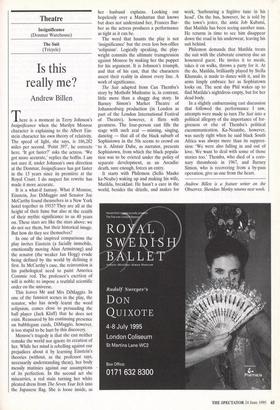Theatre
Insignificance (Donmar Warehouse) The Suit (Tricycle)
Is this really me?
Andrew Billen
There is a moment in Terry Johnson's Insignificance when the Marilyn Monroe character is explaining to the Albert Ein- stein character his own theory of relativity. The speed of light, she says, is 186,282 miles per second. 'Point 397', he corrects here. 'It got faster?' asks the actress. 'We got more accurate,' replies the boffin..I am not sure if, under Johnson's own direction at the Donmar, Insignificance has got faster in the 13 years since its premiere at the Royal Court. I do suspect his rewrite has made it more accurate.
It is a what-if fantasy. What if Monroe, Einstein, Joe DiMaggio and Senator Joe McCarthy found themselves in a New York hotel together in 1953? They are all at the height of their fame but also at the zenith of their mythic significance to us 40 years on. These stars are like the stars above: we do not see them, but their historical image. But how do they see themselves?
In one of the inspired comparisons the play invites Einstein (a facially immobile, emotionally moving Alun Armstrong) and the senator (the weaker Ian Hogg) evade being defined by the world by defining it first. In McCarthy's case, the reinvention is his pathological need to paint America Commie red. The professor's exertion of will is noble: to impose a truthful scientific order on the universe.
This leaves Mr and Mrs DiMaggio. In one of the funniest scenes in the play, the senator, who has newly learnt the word solipsism, comes close to persuading the ball player (Jack Klaff) that he does not exist. Reassured by his continuing presence on bubblegum cards, DiMaggio, however, is too stupid to be hurt by this discovery.
Monroe's tragedy is that she can neither remake the world nor ignore its creation of her. While her mind is rebelling against our prejudices about it by learning Einstein's theories (without, as the professor says, necessarily understanding them), her body messily mutinies against our assumptions of its perfection. In the second act she miscarries, a red stain turning her white pleated dress from The Seven Year Itch into the Japanese flag. She is loose inside, as her husband explains. Looking out hopelessly over a Manhattan that knows but does not understand her, Frances Bar- ber as the actress produces a performance as tight as it can be.
The word that haunts the play is not `insignificance' but the even less box-office `solipsism'. Logically speaking, the play- wright commits the ultimate transgression against Monroe by making her the puppet for his argument. It is Johnson's triumph, and that of his cast, that the characters assert their reality in almost every line. A work of significance.
The Suit adapted from Can Themba's story by Mothobi Mutloatse is, in contrast, little more than a shaggy dog story. In Barney Simon's Market Theatre of Johannesburg production (in London as part of the London International Festival of Theatre), however, it flirts with greatness. The four-person cast fills the stage with such zeal — miming, singing, dancing — that all of the black suburb of Sophiatown in the 50s seems to crowd on to it. Alistair Dube, as narrator, presents Sophiatown, from which the black popula- tion was to be evicted under the policy of separate development, as an Arcadia: death, sure enough, forces an entry.
It starts with Philemon (Sello Maake ka-Ncube) waking up and making his wife, Matilda, breakfast. He hasn't a care in the world, besides the drizzle, and makes for work, 'harbouring a fugitive tune in his head'. On the bus, however, he is told by the town's jester, the antic Job Kubatsi, that Matilda has been seeing another man. He returns in time to see him disappear down the road in his underwear, leaving his suit behind.
Philemon demands that Matilda treats the suit with the elaborate courtesy due an honoured guest. He invites it to meals, takes it on walks, throws a party for it. At the do, Matilda, brilliantly played by Stella Khumalo, is made to dance with it, and its arms limply embrace her as Sophiatown looks on. The next day Phil wakes up to find Matilda's nightdress empty, but for her dead body.
In a slightly embarrassing cast discussion that followed the performance I saw, attempts were made to turn The Suit into a political allegory of the importance of for- giveness or else of Themba's political excommunication. Ka-Ncumbe, however, was surely right when he said black South Africa was always more than its suppres- sion: 'We were also falling in and out of love. We want to deal with some of those stories too.' Themba, who died of a coro- nary thrombosis in 1967, and Barney Simon, who is recovering from a by-pass operation, give us one from the heart.
Andrew Billen is a feature writer on the Observer. Sheridan Morley returns next week.


























































 Previous page
Previous page